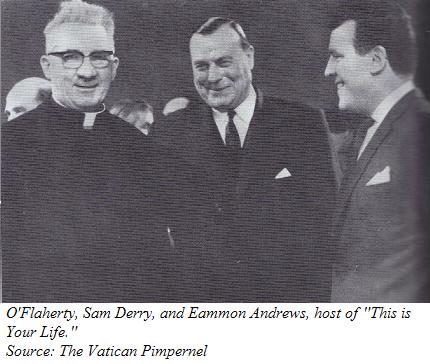 O’Flaherty suffered the first of two strokes in June 1960, and retired from the Holy Office in September. He returned to Ireland to live with his sister, Bride and her husband Chris Sheehan in Cahersiveen, County Kerry. Determined to still be useful, he took on a position as a sort of advisor to the Diocese of Los Angeles, and traveled to the US from time to time to do legal and canonical work. Eventually even this became too much for him.
O’Flaherty suffered the first of two strokes in June 1960, and retired from the Holy Office in September. He returned to Ireland to live with his sister, Bride and her husband Chris Sheehan in Cahersiveen, County Kerry. Determined to still be useful, he took on a position as a sort of advisor to the Diocese of Los Angeles, and traveled to the US from time to time to do legal and canonical work. Eventually even this became too much for him. His life in Cahersiveen was quiet, and his greatest enjoyments were visiting friends and attending football matches. He still did not talk about the war, except on one occasion. In February 1963, the British TV program This is Your Life featured Sam Derry in an episode. While a national audience watched, old colleagues and former POWs came forward and spoke about the occupation of Rome and the escape organization to which most of them owed their lives. At the end, a surprise guest was announced, and Hugh O’Flaherty walked falteringly from the wings to embrace his old friend. He was there to pay tribute to Sam Derry, but the Englishman wouldn’t let him get away without accepting tribute in his turn. “Had it not been for this gallant gentleman,” Derry would write in his memoirs, “there would have been no Rome Escape Organization.”
The BBC program was the last time anyone from those turbulent years would have the chance to see the Monsignor. Eight months later, he died peacefully at home in Cahersiveen. His grave is simple: “In Loving Memory of Rt. Rev. Mgr. Hugh O’Flaherty, born 28th February 1898, ordained 20th December 1925, died 30th October 1963. R.I.P.”
A grove of Italian trees was planted in Killarney National Park as a memorial him. Another tree stands in his honor in the Yad Vashem Holocaust Memorial in Jerusalem. And the Holocaust Martyrs and Heroes Authority conferred on him the title “Righteous Among Nations.”
But all that came later. At the time of O’Flaherty’s death, it was a fellow Kerryman, Father Francis Joy, who wrote this obituary for him:
“Hugh O’Flaherty was above all a generous honest-to-God Irishman without guile. His big heart was open to any and every distress and he was lavish in his efforts to assuage suffering in any form, a facet of his character with made him an easy target for any hard-luck story . . . His career in the Vatican was not without its checks and frustrations. But with his sunny disposition he was proof against such embarrassments. And above all one could say of him that, without ostentation, his life was always ordered to using his powers in fair weather or foul for the glory of God.